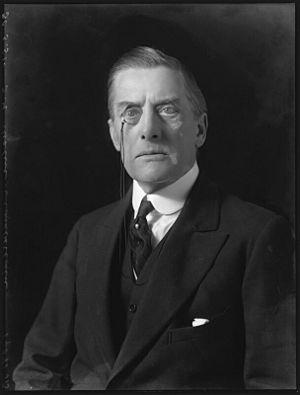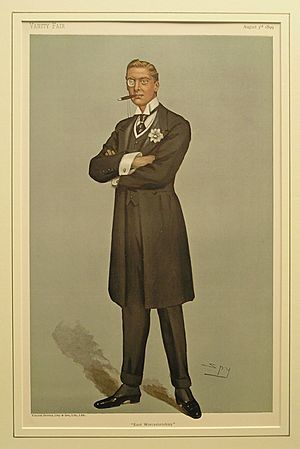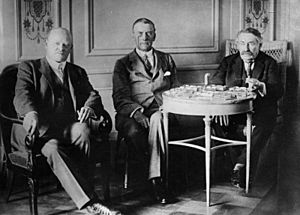Austen Chamberlain facts for kids
Quick facts for kids
Sir Austen Chamberlain
|
|
|---|---|

Chamberlain in 1931
|
|
| First Lord of the Admiralty | |
| In office 24 August 1931 – 5 November 1931 |
|
| Prime Minister | Ramsay MacDonald |
| Preceded by | A. V. Alexander |
| Succeeded by | Sir Bolton Eyres-Monsell |
| Foreign Secretary | |
| In office 3 November 1924 – 4 June 1929 |
|
| Prime Minister | Stanley Baldwin |
| Preceded by | Ramsay MacDonald |
| Succeeded by | Arthur Henderson |
| Lord Privy Seal Leader of the House of Commons |
|
| In office 1 April 1921 – 23 October 1922 |
|
| Prime Minister | David Lloyd George |
| Preceded by | Bonar Law |
| Succeeded by | Lord Robert Cecil |
| Chancellor of the Exchequer | |
| In office 9 October 1903 – 4 December 1905 |
|
| Prime Minister | Arthur Balfour |
| Preceded by | Charles Thomson Ritchie |
| Succeeded by | H. H. Asquith |
| In office 10 January 1919 – 1 April 1921 |
|
| Prime Minister | David Lloyd George |
| Preceded by | Bonar Law |
| Succeeded by | Sir Robert Horne |
| Secretary of State for India | |
| In office 25 May 1915 – 17 July 1917 |
|
| Prime Minister | |
| Preceded by | The Marquess of Crewe |
| Succeeded by | Edwin Montagu |
| Postmaster General | |
| In office 11 August 1902 – 9 October 1903 |
|
| Prime Minister | Arthur Balfour |
| Preceded by | The Marquess of Londonderry |
| Succeeded by | Lord Stanley |
| Personal details | |
| Born |
Joseph Austen Chamberlain
16 October 1863 Birmingham, Warwickshire, England, United Kingdom of Great Britain and Ireland |
| Died | 16 March 1937 (aged 73) London, England, United Kingdom of Great Britain and Northern Ireland |
| Political party | Liberal Unionist Conservative |
| Spouse |
Ivy Muriel Dundas
(m. 1906) |
| Children | 3 |
| Parents | Joseph Chamberlain Harriet Kenrick |
| Education | Rugby School |
| Alma mater | Trinity College, Cambridge Sciences Po University of Berlin |
| Signature | |
Sir Joseph Austen Chamberlain (born October 16, 1863 – died March 16, 1937) was an important British statesman. He was the son of Joseph Chamberlain and the older half-brother of future Prime Minister Neville Chamberlain. Austen held several key government jobs, including Chancellor of the Exchequer (in charge of the country's money) twice. He was also briefly the leader of the Conservative Party before becoming Foreign Secretary, which is like the top diplomat for the country.
Austen was expected to follow in his famous father's political footsteps. He became a Member of Parliament (MP) in 1892 for the Liberal Unionist group. He worked in government from 1895 to 1905. He became Chancellor of the Exchequer in 1903. After his father became ill in 1906, Austen became a leading voice for "Tariff Reform" in Parliament, which was about changing taxes on imported goods.
During World War I, Chamberlain joined the government as Secretary of State for India. He later resigned due to problems with a military campaign in Mesopotamia. He returned to government as Chancellor of the Exchequer again. He then led the Conservative Party in the House of Commons from 1921 to 1922.
Later, he served as Foreign Secretary from 1924 to 1929. During this time, he helped create the Locarno Pact in 1925. This agreement aimed to prevent war between France and Germany. For his work, he was awarded the Nobel Peace Prize. He held his last government job in 1931 as First Lord of the Admiralty, which oversees the navy. In the 1930s, he was one of the few MPs who supported Winston Churchill's calls for Britain to build up its military against the growing threat from Germany. He remained an active MP until his death in 1937.
| Top - 0-9 A B C D E F G H I J K L M N O P Q R S T U V W X Y Z |
Early Life and Education
Austen Chamberlain was born in Birmingham, England. He was the second child and first son of Joseph Chamberlain, who was a powerful politician. Austen's mother, Harriet Kenrick, died when he was born. His father later married Harriet's cousin, Florence, and they had more children, including Neville Chamberlain, who would become Prime Minister.
Austen went to Rugby School and then to Trinity College, Cambridge. At Cambridge, he became friends with F. S. Oliver. He gave his first political speech in 1884 and was a leader in the university's Political Society.
His father wanted him to have a political career. So, Austen studied in Paris at the Paris Institute of Political Studies. He admired French culture and met important French politicians like Georges Clemenceau.
After Paris, Austen spent a year in Berlin, Germany. He learned German and met famous figures like Otto von Bismarck. While studying at the University of Berlin, he became suspicious of the strong nationalism he saw there. This experience made him think about the dangers of German nationalism later in his life.
Starting His Political Career
Austen returned to England in 1888. He was elected to Parliament in 1892 for East Worcestershire. He was part of his father's Liberal Unionist Party. He gave his first speech in Parliament in April 1893. Even the Prime Minister, William Ewart Gladstone, praised his speech. This was a big deal because Gladstone and Austen's father had a difficult relationship.
Becoming a Government Minister
After the 1895 election, Chamberlain became the Civil Lord of the Admiralty, which was a junior role in the navy department. He held this job until 1900. Then, he became the Financial Secretary to the Treasury, helping manage the country's money.
In 1902, Arthur Balfour became Prime Minister. He promoted Chamberlain to Postmaster General, making him a member of the Cabinet. This was a very important step for his career.
First Time as Chancellor
In 1903, Austen Chamberlain became Chancellor of the Exchequer. This happened because of disagreements between his father and Prime Minister Balfour. Austen supported his father's ideas about trade. However, his influence in the Cabinet was less after his father left the government. The government faced strong opposition and internal problems. In December 1905, the Unionists lost power. In the 1906 election, Austen was one of the few Liberal Unionists who kept his seat in the House of Commons.
After his father had a stroke and retired from politics, Austen became the main leader of the "tariff reform" movement within the Unionist Party. This made him a possible future leader of the party.
Leadership Challenges
After losing elections in 1910, the Unionist Party was struggling. Their leader, Arthur Balfour, stepped down in November 1911. Chamberlain was a top candidate to become the new Conservative leader.
Other candidates included Bonar Law and Walter Long. It seemed that Walter Long might win by a small number of votes. To avoid splitting the party, Chamberlain decided to withdraw from the race. He convinced Long to do the same, and they both supported Bonar Law. Law was then chosen as the new leader.
Chamberlain's decision helped keep the Conservative and Liberal Unionist parties united. This was important during a time of great stress for the party.
Ireland and World War I
Before World War I started, Chamberlain was very focused on the issue of Home Rule for Ireland. This was a proposal to give Ireland more self-government. Chamberlain was strongly against breaking up the union between Britain and Ireland. His father died in July 1914, just days after the assassination of Archduke Franz Ferdinand, which led to the start of the war.
Serving During Wartime
In 1915, a coalition government was formed during the war. Chamberlain joined the Cabinet as Secretary of State for India. He supported the invasion of Mesopotamia to increase British influence in the region.
Chamberlain remained in his role when David Lloyd George became Prime Minister in late 1916. However, after an investigation into the failed Kut Campaign in Mesopotamia, Chamberlain resigned in 1917. He took responsibility as the minister in charge, which was seen as a very honorable act.
He later returned to government in April 1918 as a Minister without Portfolio, meaning he had no specific department but was part of the War Cabinet. After the coalition won the 1918 election, Chamberlain became Chancellor of the Exchequer again in January 1919. He faced the huge challenge of fixing Britain's finances after four years of war.
Leading the Party
In 1921, Bonar Law retired as the Conservative leader due to poor health. Chamberlain became the Leader of the House of Commons and also took on the role of Lord Privy Seal. He was replaced as Chancellor by Sir Robert Horne. It seemed that after many years, Austen might finally become Prime Minister.
However, the coalition government led by Lloyd George was weakening. Many Conservative MPs wanted to end the coalition and return to a single-party Conservative government. In the autumn of 1922, Chamberlain faced a revolt from his own party members, led by Stanley Baldwin. At a meeting of Conservative MPs, they voted to fight the next election as an independent party. Chamberlain resigned as party leader rather than go against what he believed was his duty. Bonar Law became the new leader and formed a government, but Chamberlain was not given a job.
Austen Chamberlain is one of the few Conservative leaders who did not lead the party into a general election. He was also the only Conservative leader in the 20th century, until William Hague (1997–2001), who did not become Prime Minister.
Foreign Secretary Role
After Bonar Law resigned in May 1923, Stanley Baldwin became the new party leader. Baldwin offered Chamberlain a job, but Chamberlain wanted other former coalition ministers to be included too, which Baldwin refused. However, Chamberlain returned to government when Baldwin formed his second government in 1924. He served as Foreign Secretary from 1924 to 1929. Baldwin largely let Chamberlain manage foreign policy on his own.
His time as Foreign Secretary is where Chamberlain made his biggest mark on history. He dealt with difficult international situations. These included disagreements with France and issues with the 1924 Geneva Protocol, which could have affected Britain's power over economic sanctions.
The Locarno Pact
Chamberlain's most famous achievement was his role in the Locarno Pact of 1925. He wanted to keep peace in Western Europe after World War I. He welcomed the idea from German Foreign Minister Gustav Stresemann for Britain to guarantee Germany's western borders. Chamberlain hoped this would help France and Germany become friends again.
He believed that if France and Germany improved their relationship, France would stop supporting its allies in Eastern Europe. This would force countries like Poland and Czechoslovakia to accept German demands for certain territories peacefully.
In October 1925, Chamberlain, Stresemann, and Aristide Briand of France met in Locarno, Switzerland. They signed an agreement with Belgium and Italy to settle all disagreements peacefully, without war. For his work on this pact, Chamberlain was awarded the Nobel Peace Prize. He was also made a Knight of the Order of the Garter, a very high honor.
Chamberlain also helped Britain join the Kellogg-Briand Pact, which aimed to make war illegal. He famously said that Italian dictator Benito Mussolini was "a man with whom business could be done."
Later Political Life
After leaving his role as Foreign Secretary in 1929, Chamberlain retired from government for a short time. He returned briefly in 1931 as First Lord of the Admiralty in Ramsay MacDonald's National Government. He soon retired again after dealing with the Invergordon Mutiny, a naval protest.
For the next six years, as a senior MP, he supported the National Government on issues at home. However, he was critical of their foreign policy. In 1935, he helped save the government from defeat in Parliament during a crisis over a peace agreement.
In 1935, he was considered for Foreign Secretary again but was thought to be too old. Instead, his advice was sought on whether Anthony Eden should get the job.
Calls for Rearmament
From 1934 to 1937, Chamberlain was one of the strongest voices, along with Winston Churchill, calling for Britain to build up its military. This was because of the growing threat from Nazi Germany.
In 1935, the government announced some rearmament plans. Even though the Labour Party opposed these plans, Chamberlain continued to push for stronger defenses. He met with Prime Minister Stanley Baldwin to urge him to speed up rearming Britain's military. Chamberlain was highly respected and became an inspiration to younger Conservatives.
He remained in good health until his death in March 1937, at the age of 73. This was just ten weeks before his younger half-brother, Neville, became Prime Minister. He is buried in East Finchley Cemetery in London.
See Also
 In Spanish: Austen Chamberlain para niños
In Spanish: Austen Chamberlain para niños
- List of covers of Time magazine (1920s) (30 November 1925)
Images for kids
 | James B. Knighten |
 | Azellia White |
 | Willa Brown |





